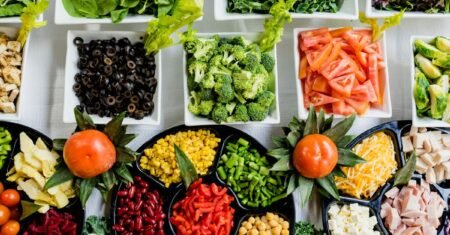
Eating healthy is essential for feeling good and staying energized. A balanced diet includes a variety of foods that provide the nutrients your body needs. In this article, we will explore simple tips to help you eat better and enjoy your meals more. From understanding what makes up a healthy diet to practical ways to include nutritious foods in your daily life, we’ve got you covered!
Key Takeaways
- A healthy diet includes fruits, vegetables, whole grains, and lean proteins.
- Staying hydrated is crucial for your overall health and energy levels.
- Mindful eating helps you enjoy your food and control portion sizes.
- Planning meals can save money and ensure you eat balanced meals.
- Avoiding processed foods can lead to better health outcomes.
Understanding the Basics of Healthy Eating
What Constitutes a Healthy Diet?
When I think about a healthy diet, I realize it’s not just about eating salads all day. It’s about balance! Here’s what I keep in mind:
- Variety is key: Include different food groups.
- Moderation matters: Don’t overdo it on any one thing.
- Listen to your body: Eat when you’re hungry, stop when you’re full.
Importance of Balanced Nutrition
I’ve learned that balanced nutrition is super important for feeling good. It helps me:
- Maintain energy levels throughout the day.
- Support my immune system.
- Keep my mood stable.
Eating well isn’t about strict rules; it’s about enjoying food that makes me feel great!
Common Misconceptions About Healthy Eating
There are so many myths out there! Here are a few I’ve come across:
- Healthy food is boring: Not true! There are tons of delicious options.
- You have to cut out all treats: Nope! Moderation is the name of the game.
- All fats are bad: Some fats are actually good for you, like those found in avocados and nuts.
Remember, avoiding common diet mistakes can really help you on your journey to a healthier lifestyle!
Incorporating Fruits and Vegetables into Your Diet
Benefits of Eating Fruits
Fruits are not just tasty; they’re packed with nutrients! Eating a variety of fruits can help boost your immune system and keep you feeling great. Here are some easy ways to add more fruits to your day:
- Toss some berries into your morning cereal.
- Enjoy a fruit salad for dessert.
- Snack on an apple or banana instead of chips.
Remember, the more colorful your plate, the better!
Nutritional Value of Vegetables
Vegetables are super important for our health. They provide essential vitamins and minerals. I try to get a variety of different colored vegetables at each meal. Here’s how I make sure I’m eating enough:
- Add spinach or kale to smoothies.
- Roast colorful veggies like bell peppers and carrots.
- Snack on raw veggies with hummus or dip.
Tips for Adding More Produce to Your Meals
Getting more fruits and veggies into your meals can be fun! Here are some tips I use:
- Mix it up: Try new recipes that include different fruits and veggies.
- Prep ahead: Cut up fruits and veggies and keep them in the fridge for quick snacks.
- Get creative: Use fruits in salads or veggies in smoothies.
Eating a variety of fruits and vegetables not only helps your body but also makes meals more exciting!
Choosing the Right Proteins

Animal-Based Protein Sources
When it comes to animal proteins, I like to keep it simple. Here are some of my go-to options:
- Lean meats like chicken and turkey
- Fish, especially those rich in omega-3s like salmon
- Eggs, which are super versatile
Remember, it’s all about being choosy. You want to focus on lean proteins and include some carbs. Avoid huge helpings of fatty meats and make sure to include vegetables.
Plant-Based Protein Options
If you’re looking to mix it up, plant-based proteins are a fantastic choice! Here’s what I love:
- Lentils and beans, which are packed with fiber
- Nuts and seeds for a crunchy snack
- Tofu and tempeh, great meat alternatives
Balancing Protein Intake
Finding the right balance is key. Here’s how I do it:
- Aim for a variety of protein sources throughout the week.
- Don’t forget to include healthy fats and carbs in your meals.
- Listen to your body; it knows what it needs!
A balanced diet is all about mixing different food groups. It’s not just about protein; it’s about feeling good overall!
The Role of Carbohydrates in a Healthy Diet
Types of Carbohydrates
Carbohydrates are super important because they’re basically the main source of energy for my body and brain. There are two main types: simple carbs and complex carbs. Simple carbs are found in things like candy and soda, while complex carbs come from foods like whole grains, fruits, and veggies. I try to stick to complex carbs because they keep me full longer and help avoid those annoying sugar crashes.
Healthy Sources of Carbs
When I think about healthy carbs, I usually go for:
- Whole grains (like brown rice and quinoa)
- Fruits (bananas, berries, you name it!)
- Vegetables (especially leafy greens)
These foods not only give me energy but also pack in other nutrients. Remember, many carbohydrate-rich foods are good sources of other vital nutrients, such as folic acid, vitamins C and E, and magnesium.
How to Avoid Refined Carbs
To keep my diet balanced, I try to limit refined carbs. Here’s how I do it:
- Swap white bread for whole grain.
- Choose brown rice over white rice.
- Avoid sugary snacks and drinks.
Eating a variety of healthy carbs can help me feel energized and satisfied throughout the day!
Understanding Fats: The Good vs. The Bad

Types of Fats
When it comes to fats, not all are created equal. Here’s a quick breakdown:
- Saturated Fats: These are often found in fatty cuts of meat, butter, and cheese. Too much can raise cholesterol levels, which isn’t great for your heart.
- Unsaturated Fats: These are the good guys! Found in olive oil, avocados, and fish, they can actually help protect your heart.
- Trans Fats: These are the ones to avoid at all costs. They’re often found in processed foods and can increase the risk of heart disease.
Benefits of Healthy Fats
Including healthy fats in your diet can be super beneficial. Here’s why:
- They help with nutrient absorption.
- They keep you feeling full and satisfied after meals.
- They support brain health and can even improve your mood.
Foods Rich in Unsaturated Fats
So, what should you be eating? Here are some tasty options:
- Olive oil
- Nuts and seeds
- Fatty fish like salmon
- Avocados
Remember, moderation is key! While fats are essential, too much can lead to weight gain and other health issues.
In conclusion, understanding the difference between good and bad fats can help you make better choices for your health. So, let’s ditch the trans fats and embrace those healthy unsaturated fats!
Hydration and Its Importance

How Much Water Do You Need?
I’ve always heard that drinking enough water is super important, but how much is enough? Well, a good rule of thumb is to aim for about 6 to 8 glasses a day. This includes the water you get from food, too!
Benefits of Staying Hydrated
Staying hydrated is not just about quenching your thirst. Here are some cool benefits:
- Boosts energy levels
- Helps with digestion
- Keeps your skin looking fresh
Tips for Drinking More Water
Sometimes, I forget to drink water throughout the day. Here are some tips that help me:
- Carry a water bottle everywhere.
- Set reminders on your phone.
- Add slices of fruit to make it more fun!
Staying hydrated is key to feeling good and keeping your body running smoothly. Plus, at 90% water, fruits like watermelon can help keep your body hydrated. They’re also full of fiber and nutrients, especially vitamin C, which helps your immune system!
Meal Planning for a Balanced Diet
Creating a Weekly Meal Plan
When I think about meal planning, I like to keep it simple and fun. A good plan helps me stay on track! Here’s how I usually do it:
- Pick a day to plan my meals for the week.
- Choose recipes that include a variety of food groups.
- Make a shopping list based on what I need.
Healthy Snack Ideas
Snacks can be a great way to keep my energy up. Here are some of my go-to healthy snacks:
- Fresh fruit like apples or bananas.
- Veggies with hummus.
- Yogurt with a sprinkle of nuts.
Balancing Macronutrients
I try to balance my meals with the right mix of macronutrients. This means I focus on:
- Carbs for energy (like whole grains).
- Proteins for muscle (like chicken or beans).
- Fats for overall health (like avocados or olive oil).
Meal planning is all about making choices that work for you. It’s not just about eating healthy; it’s about enjoying what you eat!
Mindful Eating and Portion Control
What is Mindful Eating?
Mindful eating is all about being present while you eat. It’s not just about what’s on your plate, but how you feel while eating it. Taking your time to enjoy your food can make a big difference. I’ve found that when I focus on my meal, I feel more satisfied and less likely to overeat.
Tips for Controlling Portions
Here are some simple tips that have helped me keep my portions in check:
- Use smaller plates and bowls to trick your brain into thinking you’re eating more.
- Serve yourself a little less than you think you want; you can always go back for more if you’re still hungry.
- Pay attention to your body. If you’re not hungry, don’t eat just because it’s mealtime.
Benefits of Eating Slowly
Eating slowly has its perks! Here’s why I try to take my time:
- It gives your brain time to catch up with your stomach, so you know when you’re full.
- You can really savor the flavors of your food, making meals more enjoyable.
- It helps prevent mindless eating, which can lead to overeating.
Remember, it’s not just about what you eat, but how you eat it. Focusing on your food can help you develop healthier habits.
By practicing mindful eating and being aware of portion sizes, I’ve noticed a positive change in my relationship with food. It’s all about balance and listening to what my body needs!
Avoiding Processed Foods
Why Processed Foods Are Harmful
Hey there! So, let’s talk about processed foods. They can really mess with your health! These foods often have a ton of added sugars, unhealthy fats, and preservatives. I mean, who wants to eat something that’s packed with stuff you can’t even pronounce? Here’s what I’ve learned:
- Processed meats are often named as the biggest culprits of unhealthy diets due to high calories, low protein, fillers, and preservatives such as nitrates.
- They can lead to weight gain and other health issues.
- Eating too many processed foods can make it hard to get the nutrients your body really needs.
Identifying Processed Foods
Not sure what counts as processed? Here are some tips:
- Check the ingredient list. If it’s long and filled with weird stuff, it’s probably processed.
- Look for added sugars and unhealthy fats. If you see them, it’s a red flag!
- Fresh is best! Stick to whole foods like fruits, veggies, and grains whenever you can.
Healthy Alternatives to Processed Snacks
If you’re craving a snack, try these instead:
- Fresh fruits or veggies with hummus.
- Nuts or seeds for a crunchy treat.
- Whole grain crackers with cheese.
Remember, making small changes can lead to big results! Start by swapping out one processed snack for a healthier option each week. You got this!
Healthy Eating on a Budget

Affordable Nutrient-Rich Foods
Eating healthy doesn’t have to break the bank! Here are some budget-friendly options that are also nutritious:
- Whole grains like brown rice and oats
- Frozen fruits and vegetables that are just as good as fresh
- Canned beans for protein and fiber
Meal Prep Tips to Save Money
Planning your meals can save you both time and money. Here’s how I do it:
- Make a shopping list based on your meal plan.
- Cook in bulk and freeze leftovers for later.
- Use seasonal produce to get the best prices.
Shopping Smart for Healthy Ingredients
When I hit the grocery store, I keep these tips in mind:
- Buy in bulk for items like grains and nuts.
- Look for sales on healthy items and stock up.
- Check nutrition labels to avoid processed foods.
Eating healthy on a budget is all about making smart choices. With a little planning, you can enjoy delicious meals without overspending!
The Impact of Diet on Mental Health
Foods That Boost Your Mood
Hey there! You might not realize it, but what you eat can really affect how you feel. Here are some foods that can help lift your spirits:
- Fruits and veggies: They’re packed with vitamins and minerals that can help your brain.
- Whole grains: Foods like brown rice and oats can keep your energy steady.
- Nuts and seeds: These are great for healthy fats that support brain health.
How Nutrition Affects Brain Function
I’ve learned that a balanced diet can do wonders for our brains. Here’s how:
- Improved focus: Eating the right foods can help you concentrate better.
- Better memory: Certain nutrients can help with memory retention.
- Reduced stress: A healthy diet can lower stress levels, making you feel more relaxed.
Creating a Diet for Mental Well-being
So, how do we create a diet that’s good for our minds? Here are some tips:
- Mix it up: Include a variety of foods to get all the nutrients you need.
- Stay hydrated: Drinking enough water is super important for brain function.
- Limit sugar: Too much sugar can lead to mood swings and energy crashes.
Remember, what you eat can influence your mood. It’s all about finding a balance that works for you!
And don’t forget, following something like the MIND diet can help slow cognitive decline, especially in older adults. So, let’s make those food choices count!
Eating well can really help your mind feel better. Foods rich in vitamins and minerals can boost your mood and keep your brain sharp. If you want to learn more about how diet affects mental health, visit our website for tips and advice!
Wrapping It Up: Your Journey to Healthy Eating
So, there you have it! Eating healthy doesn’t have to be a chore. It’s all about finding a balance that works for you. Remember to mix things up with different foods from all the food groups. Don’t stress too much about being perfect; just aim for more fruits, veggies, whole grains, and lean proteins. And hey, don’t forget to enjoy your meals! Eating should be fun, not a punishment. Stay active, drink plenty of water, and listen to your body. With these tips, you’ll be on your way to feeling great and living your best life!
Frequently Asked Questions
What is a balanced diet?
A balanced diet includes different types of foods from all food groups, like fruits, vegetables, grains, proteins, and dairy. This helps ensure you get all the nutrients your body needs.
Why is it important to eat fruits and vegetables?
Fruits and vegetables provide essential vitamins, minerals, and fiber. They help keep you healthy and can lower the risk of many diseases.
How can I add more fruits and vegetables to my meals?
You can add fruits and veggies by including them in smoothies, salads, or as snacks. Try to make half your plate fruits and vegetables during meals.
What are good sources of protein?
Good protein sources include lean meats, fish, eggs, beans, nuts, and dairy. If you’re vegetarian or vegan, you can get protein from beans, lentils, and tofu.
Are all fats bad for you?
Not all fats are bad. Healthy fats, like those found in avocados, nuts, and olive oil, are good for your heart. It’s important to limit unhealthy fats found in fried and processed foods.
How much water should I drink daily?
Most people should aim to drink about 8 cups of water a day, but this can vary based on your activity level and climate. Staying hydrated is key for overall health.
What is mindful eating?
Mindful eating means paying attention to what you eat and how it makes you feel. It encourages you to slow down and enjoy your meals, which can help with portion control.
How can I eat healthy on a budget?
You can eat healthy on a budget by planning meals, buying seasonal fruits and vegetables, and choosing whole foods over processed options. Meal prepping can also save money.
About the Author






0 Comments